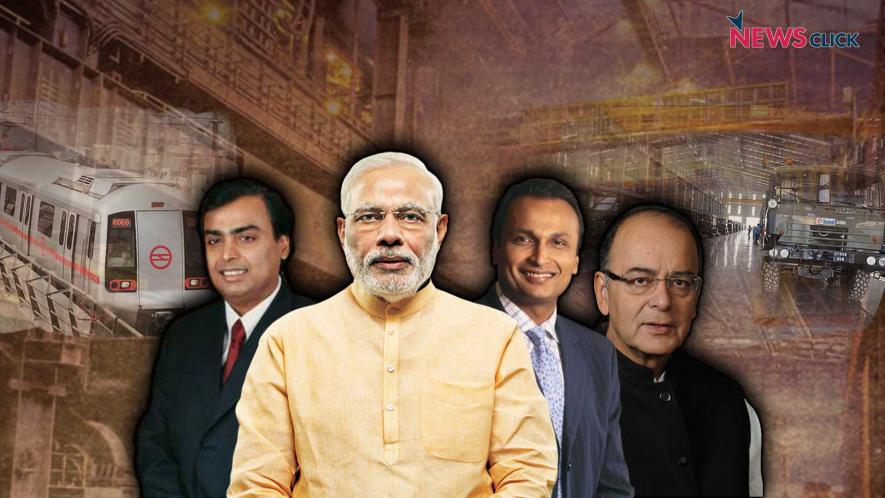Sell More Profit-Making PSUs, Privatise Metro Rail: Accelerated “Sell Out” Policy of NDA Govt

Newsclick Image by Nitesh Kumar
The BJP-led Union government has fired the opening salvo for the privatisation of the metro rail services in India by forcing States to involve private players in metro rail projects. The government has also announced its intention to accelerate the efforts to sell off public sector undertakings (PSUs), including strategic and profit-making PSUs, to the private sector.
On Wednesday, the Union Cabinet approved a new Metro Rail Policy which makes it compulsory for states to include private players in the provision of metro rail services.
Metro rail projects in India have mostly followed the Joint Venture (JV) model where the costs of the project are shared between the state and central governments. Starting with Delhi, the JV model was used for the Mumbai Line-3, Nagpur, Bengaluru, Chennai, Ahmedabad, Lucknow and Kochi metro rail projects.
The exceptions were the Airport Express Line in Delhi, Mumbai Metro Line 1 and the Hyderabad Metro, where the Public-Private Partnership (PPP) model was adopted. All three have been failures.
Out of the three, Reliance Infrastructure, which is part of the Anil DhirubhaiAmbani group, was the private party involved in Delhi and Mumbai, while the Hyderabad metro rail is being built by L&T.
E Sreedharan, former Managing Director of the Delhi Metro Rail Corporation (DMRC), has heavily criticized the new metro rail policy.
“The policy seems to have been framed by someone sitting in the NITI Aayog with absolutely no experience of how Metro rail is built and operated”, Sreedharan told The Indian Express in an interview.
The Airport Express line, built by Reliance was opened six months later than scheduled, after missing four deadlines. Having begun operations in February 2011, Reliance shut down the line on 8 July 2012 after finding the line loss-making. The line remained closed for 7 months, after which the DMRC stepped in to take it over.
Even after the delays in construction and keeping the Airport Express line closed for several months, Reliance won a compensation of Rs. 2,950 crore for the termination of the concession agreements for the project, further adding to the costs for the public.
In Mumbai Metro Line 1, “Reliance Infrastructure took almost 7 years to complete 11 km of the relatively easier elevated line and they now claim to be losing 50 lakh per day in revenue everyday despite the very high fares they are charging”, Sreedharan said.
The construction of Phase 1 of the Hyderabad metro rail began in April 2012, but ran into delays. L&T was recently granted a 17-month extension of the deadline, with Phase 1 expected to open in November 2018. Sreedharan said that L&T had come forward for the project after being offered 300 acres of land for property development. “But since then, property values have come down and real estate is not making the same kind of money as it used to. Even 7 years after they first started the project, Hyderabad hasn’t managed to open even one section since once that is done, L&T will have to start repaying the bank. L&T has already started raising claims on the government with regard to loss of revenue”, he said.
The new Metro Rail policy also requires the States to clearly indicate in the project report the measures to be taken for commercial/property development at stations to generate revenue through advertisements, lease of space, etc. The States are now expected to set up a permanent Fare Fixation Authority for “timely revision of fares”.
Accelerated Disinvestment
While the government has announced its eagerness to open up metro rail projects for private players, it has also decided to set up an “Alternative Mechanism” headed by Arun Jaitley for the sale of Public Sector Undertakings (PSUs).
The decision was taken by the Cabinet Committee on Economic Affairs (CCEA) chaired by PM Narendra Modi. Finance Minister Arun Jaitley, and Nitin Gadkari, the Minister for Road Transport & Highways, are among the members of the Alternative Mechanism (AM).
The Alternative Mechanism will take decisions on matters relating to terms and conditions of the sale, from the stage of inviting of Express of Interests from potential buyers till inviting of financial bids.
The Core Group of Secretaries (CGD) is to be empowered "to take policy decisions with regard to procedural issues and to consider deviations as necessary from time to time for effective implementation of decisions of CCEA", said a government press release.
The previous NDA government had set up a Disinvestment Ministry headed by Arun Shourie to preside over the sale of Public Sector Undertakings.
The companies shortlisted for strategic disinvestment this year are BEML Limited, Scooters India Limited and Pawan Hans Ltd and three units of the Steel Authority of India Limited (SAIL), The Mint reported.
BEML, Scooters India and Pawan Hans are profit-making companies, while SAIL is one of the largest steel producers in India. The proposal to privatise BEML, a Defence PSU, has evoked strong protests, as Newsclick reported earlier. The decision to private Pawans Hans Ltd, which provides helicopter services, has been questioned by the Parliamentary Standing Committee on Transport, Tourism and Culture.
Get the latest reports & analysis with people's perspective on Protests, movements & deep analytical videos, discussions of the current affairs in your Telegram app. Subscribe to NewsClick's Telegram channel & get Real-Time updates on stories, as they get published on our website.
























